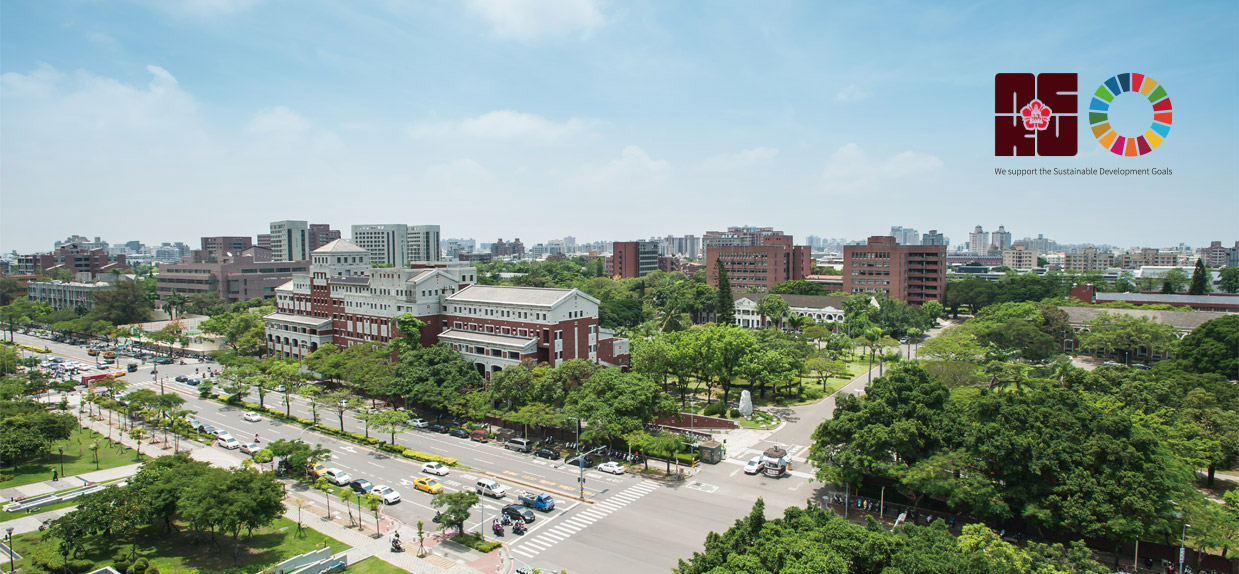
Policy waste disposal - landfill policy

NCKU’s policy waste disposal
- Waste Collection and Recycling Schedule
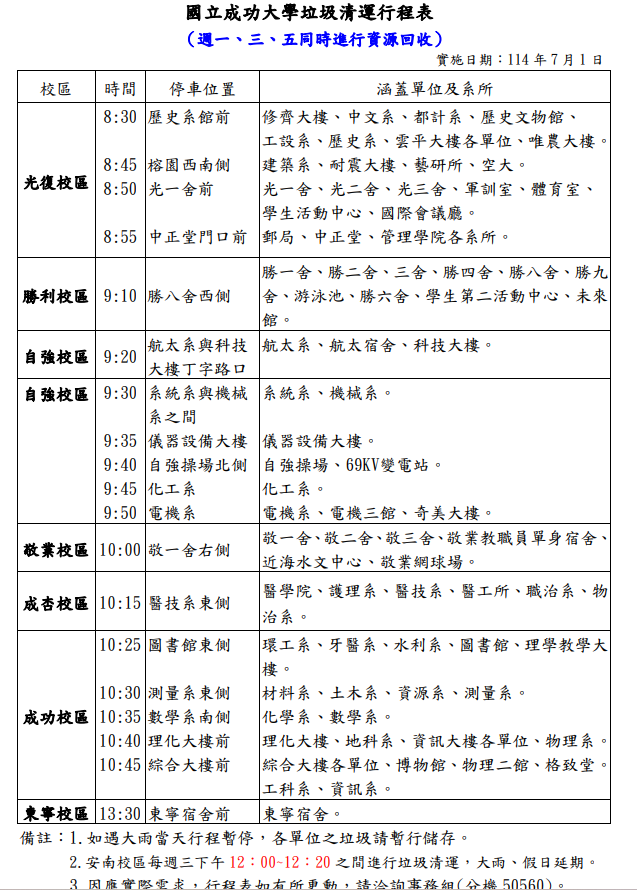
NCKU has established a “Garbage Collection and Recycling Schedule,” with fixed collection times on Mondays, Wednesdays, and Fridays. The collection is carried out in designated time slots across all campuses, including Kuang-Fu, Sheng-Li, Tzu-Chiang, Ching-Yeh, Cheng-Hsin, Cheng-Kung, and Tung-Ning, where garbage and recyclables are gathered at specified locations. Each unit must consolidate its waste according to the schedule, with collection postponed in case of heavy rain or holidays. Additionally, an extra collection is provided at Tzu-Chiang Campus between 12:00–12:20 noon to ensure comprehensive coverage. This system ensures efficient waste classification and recycling operations, maintaining campus cleanliness and supporting environmental sustainability.
- Promote waste reduction and sorting to implement effective resource recycling
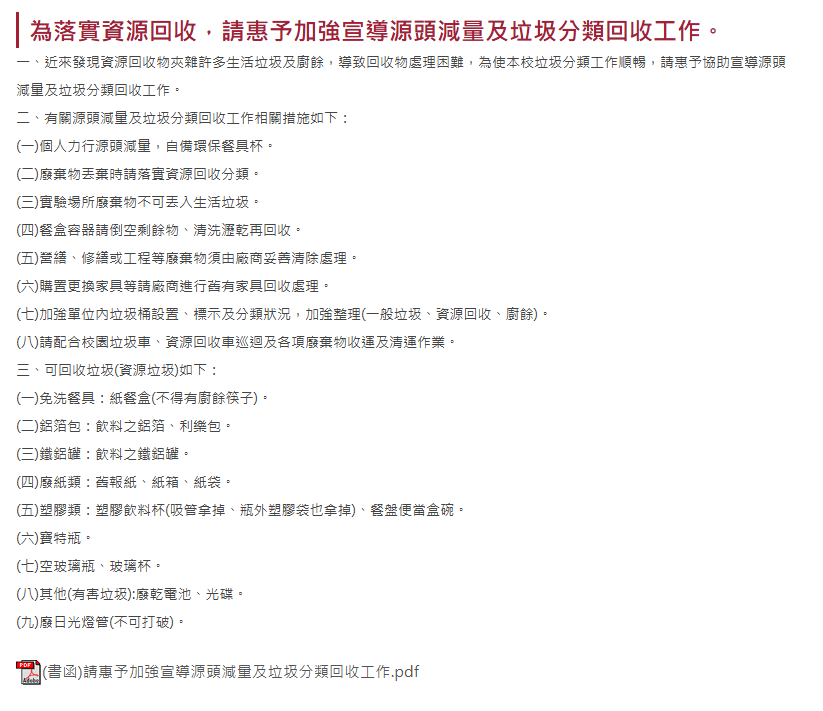 To promote resource recycling, National Cheng Kung University has implemented a “Waste Reduction and Classification” policy, requiring all units and individuals to minimize waste at the source and ensure proper sorting. Key measures include encouraging the use of reusable utensils, disposing of waste only at designated collection points, rinsing and cleaning food containers before recycling, and improving bin labeling across campus. Recyclable items include paper food boxes (without food residue), aluminum cans, tin cans, paper waste, plastics, glass bottles, used batteries, CDs/DVDs, and fluorescent lamps. This policy strengthens campus waste management, improves recycling efficiency, and reinforces NCKU’s commitment to sustainability and environmental responsibility.
To promote resource recycling, National Cheng Kung University has implemented a “Waste Reduction and Classification” policy, requiring all units and individuals to minimize waste at the source and ensure proper sorting. Key measures include encouraging the use of reusable utensils, disposing of waste only at designated collection points, rinsing and cleaning food containers before recycling, and improving bin labeling across campus. Recyclable items include paper food boxes (without food residue), aluminum cans, tin cans, paper waste, plastics, glass bottles, used batteries, CDs/DVDs, and fluorescent lamps. This policy strengthens campus waste management, improves recycling efficiency, and reinforces NCKU’s commitment to sustainability and environmental responsibility. - National Cheng Kung University Directions on General and Recyclable Waste Processing
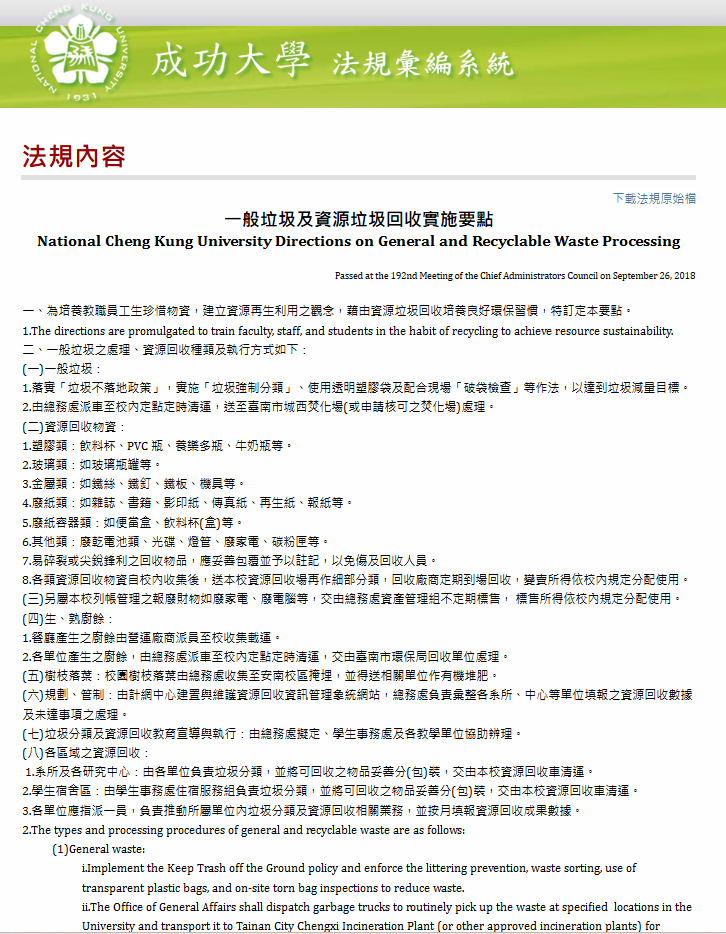 In 2018, National Cheng Kung University (NCKU) implemented the “Directions on General and Recyclable Waste Processing” to promote sustainable resource use and foster recycling habits among faculty, staff, and students. The guidelines specify waste categories, including general trash and recyclable items such as plastics, glass, metals, paper, and containers. Policies emphasize “no littering” and “mandatory waste separation,” with collection points set up across campus and waste removed regularly by the Environmental Protection Bureau or contractors. Food waste is separately managed by dining facilities or designated units. This policy enhances systematic campus waste management, reduces landfill disposal, and strengthens recycling practices.
In 2018, National Cheng Kung University (NCKU) implemented the “Directions on General and Recyclable Waste Processing” to promote sustainable resource use and foster recycling habits among faculty, staff, and students. The guidelines specify waste categories, including general trash and recyclable items such as plastics, glass, metals, paper, and containers. Policies emphasize “no littering” and “mandatory waste separation,” with collection points set up across campus and waste removed regularly by the Environmental Protection Bureau or contractors. Food waste is separately managed by dining facilities or designated units. This policy enhances systematic campus waste management, reduces landfill disposal, and strengthens recycling practices. - Tracking List for NCKU Garbage Amount Over Years
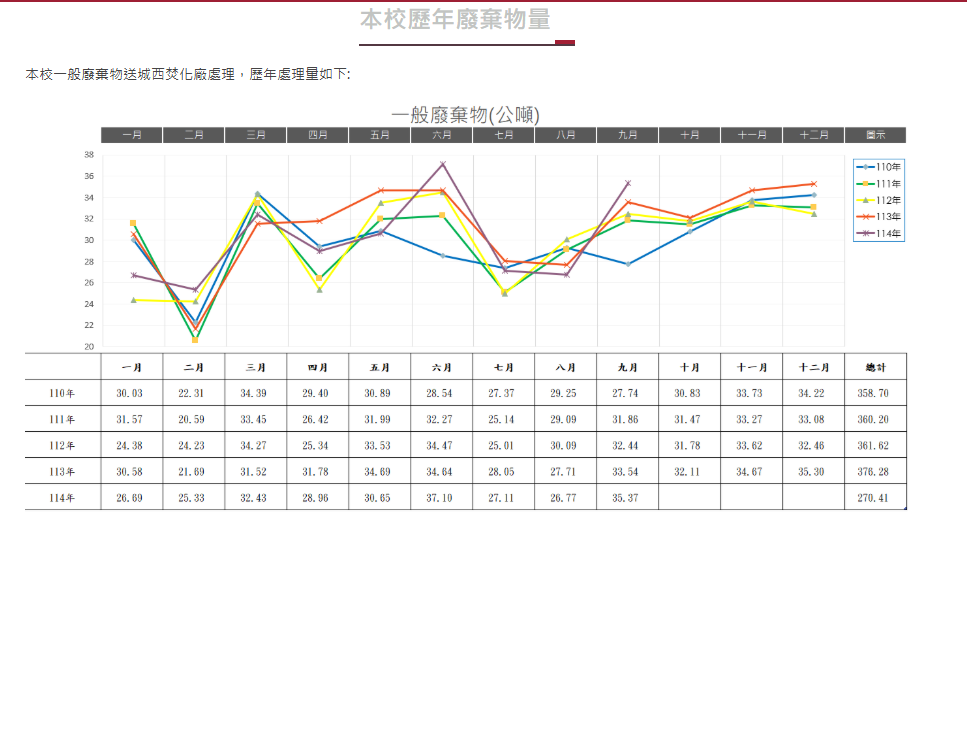 NCKU has established a “Garbage Tracking System” to monitor annual and monthly waste disposal (in metric tons) on campus. Data from 2021 to 2024 show that the total waste volume ranged between 358 to 376 tons annually, while the cumulative total for 2025 so far is 235 tons. This monitoring system enables the university to evaluate the effectiveness of its waste reduction and recycling policies, providing a key reference for future environmental management and sustainable campus planning, reinforcing waste reduction and resource circulation efforts.
NCKU has established a “Garbage Tracking System” to monitor annual and monthly waste disposal (in metric tons) on campus. Data from 2021 to 2024 show that the total waste volume ranged between 358 to 376 tons annually, while the cumulative total for 2025 so far is 235 tons. This monitoring system enables the university to evaluate the effectiveness of its waste reduction and recycling policies, providing a key reference for future environmental management and sustainable campus planning, reinforcing waste reduction and resource circulation efforts.
- Tracking List for NCKU Garbage and Recycling Amount Over Years
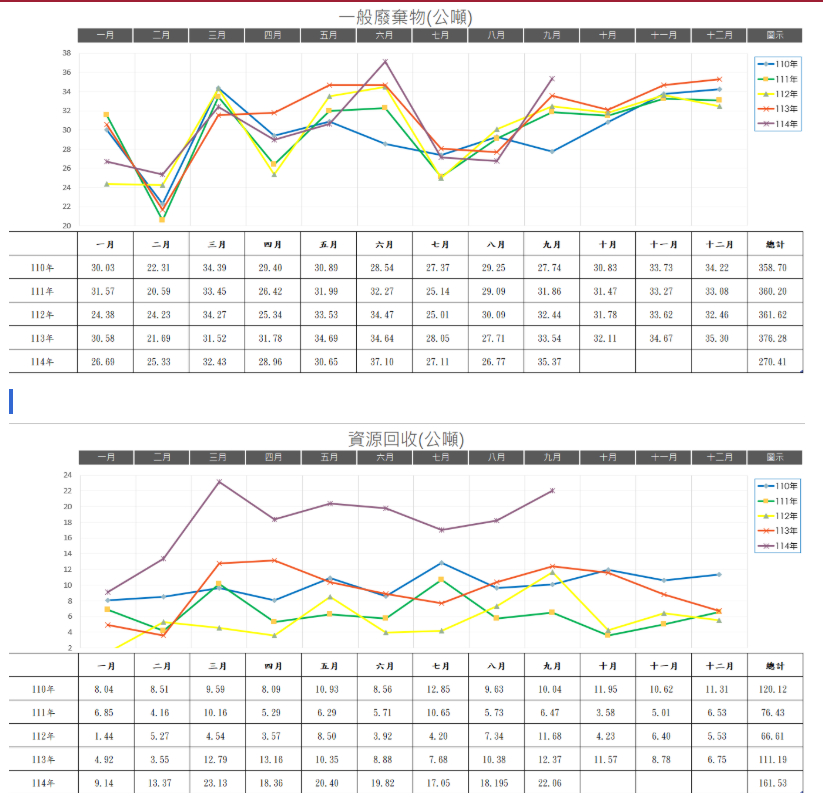 NCKU has long promoted waste reduction and resource recycling. The university records annual data on general waste and various categories of recyclables (such as paper, plastics, metals, and glass), and manages waste through scheduled collection and designated vehicles to ensure a transparent and compliant process. These data not only reflect campus waste management trends but also provide a basis for future waste reduction and circular utilization policies. This initiative strengthens campus sustainability management and social responsibility, fulfilling the environmental goals of “waste reduction, reuse, and resource recovery.”
NCKU has long promoted waste reduction and resource recycling. The university records annual data on general waste and various categories of recyclables (such as paper, plastics, metals, and glass), and manages waste through scheduled collection and designated vehicles to ensure a transparent and compliant process. These data not only reflect campus waste management trends but also provide a basis for future waste reduction and circular utilization policies. This initiative strengthens campus sustainability management and social responsibility, fulfilling the environmental goals of “waste reduction, reuse, and resource recovery.” - Laboratory Liquid Waste Disposal
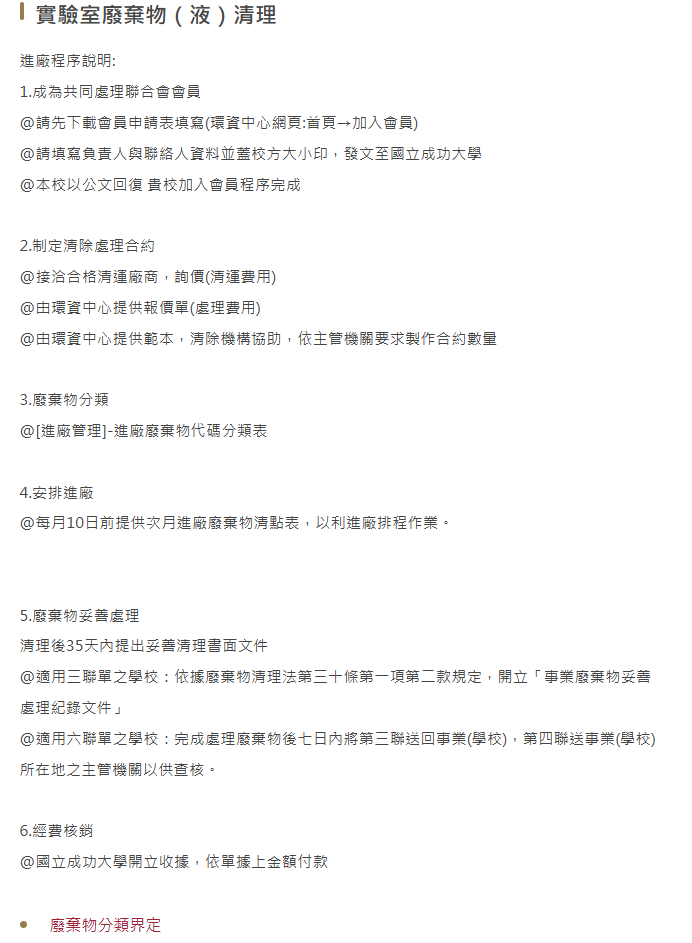 NCKU has established a procedure for “Laboratory Liquid Waste Management” to ensure compliant disposal. The process includes four main steps: (1) laboratories must first apply to become members of the joint waste treatment program, confirmed via university documentation;
NCKU has established a procedure for “Laboratory Liquid Waste Management” to ensure compliant disposal. The process includes four main steps: (1) laboratories must first apply to become members of the joint waste treatment program, confirmed via university documentation;(2) sign disposal contracts with qualified contractors, with quotations and required volumes coordinated by the Environmental Resources Center; (3) classify laboratory liquid waste according to designated coding standards to ensure accurate handling; and
(4) submit disposal lists before the 10th of each month to schedule processing.
This system enhances transparency and efficiency in laboratory waste management while minimizing environmental risks.
